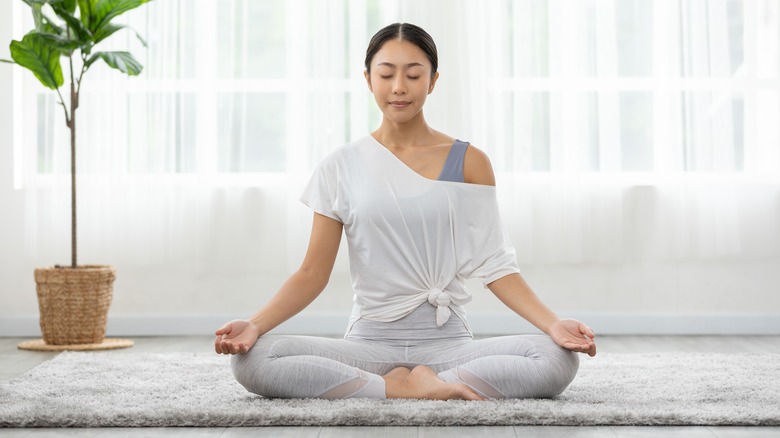Have you ever driven home and realized you barely remember the drive? Or eaten an entire meal while scrolling your phone, not even tasting your food? In today’s busy world, it’s easy to go through life on autopilot.
That’s where mindfulness comes in.
Mindfulness isn’t just about meditation or sitting cross-legged in silence. It’s about learning how to be present—fully aware of your thoughts, surroundings, and experiences, without judgment. It’s a simple but powerful shift that can dramatically improve your daily life.
Let’s explore how mindfulness can help you feel more grounded, less stressed, and more connected—to yourself and the world around you.
🌿 What Is Mindfulness?

Mindfulness is the practice of paying attention to the present moment, on purpose, and without judgment.
It sounds simple, but it’s not always easy. Our minds love to wander—into the past, the future, or a long list of worries and distractions. Mindfulness gently brings us back to now—to our breath, our senses, and our current experience.
The practice has deep roots in meditation traditions, especially Buddhism, but it’s now backed by modern science and embraced by people from all walks of life.
🧠 Why Mindfulness Matters
We live in a fast-paced, noisy world. Many of us juggle jobs, family, technology, and constant notifications. Our brains are often in overdrive, which can lead to stress, anxiety, burnout, and even health problems.
Mindfulness helps us:
- Slow down and breathe
- Reduce stress and anxiety
- Improve focus and clarity
- Build emotional awareness
- Sleep better
- Feel more joy and gratitude
The best part? You don’t need hours of meditation. Just a few moments of awareness can make a big difference.
🏡 Mindfulness in Daily Life: Small Moments, Big Impact
Mindfulness isn’t something you only do on a yoga mat or during meditation. You can bring it into your daily routine—in ways that feel natural and doable.
Here are a few simple ways to practice mindfulness every day:
☕ 1. Mindful Morning Routine

Start your day with intention. Instead of rushing to check your phone, take a few deep breaths. Stretch, sip your coffee slowly, or just look out the window for a moment.
Ask yourself: How do I feel right now? What do I need today?
This small pause can set the tone for your whole day.
🧼 2. Be Present in Simple Tasks
You don’t need extra time to be mindful—just a little more attention.
Try this: The next time you’re brushing your teeth, washing dishes, or folding laundry, bring your full focus to the task. Notice the texture, the sound, the rhythm. Let yourself be fully there.
These “boring” moments can become calming rituals.
🥗 3. Eat Without Distractions
Eating mindfully means actually tasting your food. Sit down, slow down, and eat without screens. Notice the colors, smells, and textures of your meal. Chew slowly. Appreciate where your food came from.
Mindful eating can help you feel more satisfied and connected to your body.
🌳 4. Connect With Nature

You don’t have to go hiking to enjoy nature. Just stepping outside for a few minutes can reset your mind.
Look at the sky. Feel the breeze. Notice a tree or flower. Listen to the sounds around you. Nature is a powerful anchor to the present moment.
📵 5. Take Tech Breaks
Our phones pull our attention in a million directions. Try taking short breaks from screens throughout your day.
Silence notifications. Go for a walk without your phone. Create tech-free zones (like during meals or before bed). This gives your mind a chance to rest and reset.
🧘 6. Try Short Breathing Exercises
You don’t need to sit in silence for 30 minutes. Even 2 minutes of focused breathing can calm your nervous system and help you feel more grounded.
Try this simple technique:
- Inhale for 4 counts
- Hold for 4 counts
- Exhale for 4 counts
- Hold for 4 counts
(Repeat 3–5 times)
This “box breathing” method is used by athletes and even first responders to stay calm in high-stress moments.
💬 How Mindfulness Changes Your Mind and Body
Research shows that regular mindfulness practice can literally change your brain.
It can:
- Shrink the part of the brain linked to fear and stress (amygdala)
- Strengthen areas related to attention and emotional regulation
- Lower blood pressure and improve immune response
Over time, you may notice you’re less reactive, more patient, and more aware of your own thoughts and emotions.
It’s like giving your brain a tune-up.
❤️ Be Gentle With Yourself
Mindfulness is a practice—not perfection. Some days you’ll feel focused and calm. Other days your mind will race, and that’s okay.
The goal isn’t to “clear your mind” or never feel stress again. It’s to notice what’s happening without judging it. Every time you bring your attention back to the present, you’re strengthening your awareness muscle.
Even one mindful breath is a win.
🌟 Final Thoughts: Start Small, Feel the Shift
You don’t need to change your whole lifestyle to feel the benefits of mindfulness. Start small. Be curious. Notice your thoughts without getting swept away by them.
Whether it’s one mindful meal, one tech-free walk, or one deep breath before a stressful moment—it all counts.
The more you practice, the more you’ll realize: life feels better when you’re fully here for it. So pause. Breathe. Notice. This moment is all you need.

